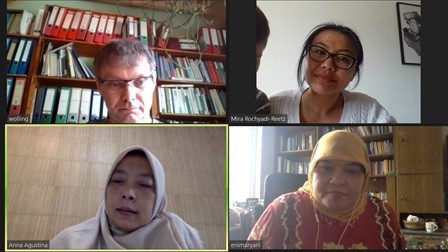The EMPK research group is conducting a joint research project with the Department of Media and Communication of Universitas Padjadjaran (UNPAD) and Universitas Pancasila (UP) in Indonesia. Representative national surveys were conducted in both countries to investigate the influence of the media on public perception of the corona crisis. The research in Indonesia builds on the constructs and indicators developed by the EMPK research team. The survey took place in both countries approximately 50 days after the beginning of the pandemic. This offers the opportunity to analyse the data from both countries in a comparative perspective.
Compared to the European situation, the infection rate with the corona virus in Indonesia is comparatively low. So far, about 25,000 positive cases have been detected and about 1,400 people have died as a result of the corona virus. In Germany, the number of infections has now reached almost 185,000 with more than 8,000 deaths.
Despite the low number of infections in Indonesia, the representative surveys show that Indonesians perceive the corona crisis as more intense than Germans. More than 90% of Indonesians are afraid of being infected with the virus, while less than 60% of German respondents are afraid of being infected. The same picture emerges with the economic crises. More than 90% of the respondents in Indonesia agree that their economic situation is negatively affected, while less than 65% of the German respondents agree with this statement.
The relevance of the sources of information during the crisis was also different in the two countries: Indonesian respondents rely more on private television (86%) than on public television (57%), while in Germany more people frequently use public television (71%) to obtain information on the topic, and private providers are used by a smaller group (53%). The surveys also show that more Indonesians (65%) than Germans (43%) frequently use the government's websites and social media to obtain information about Corona. These preliminary results raise the question of how to explain the differences between the countries. The researchers discuss characteristics of the economic situation, the health care system, the political and media system as possible explanations.
The research team has already published first results of the surveys in Indonesia and Germany and received positive media coverage in both countries. Both teams are currently preparing joint publications.




